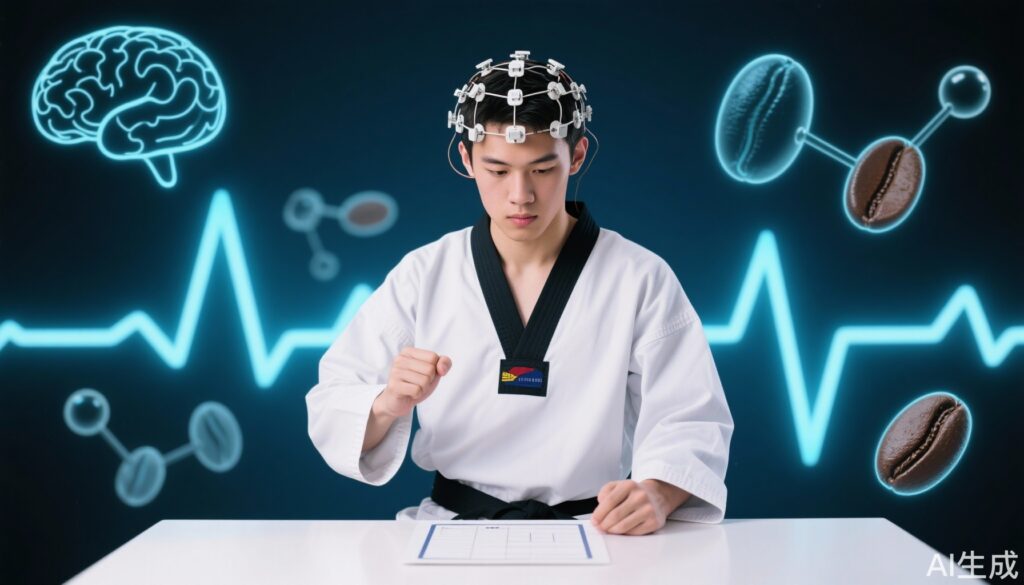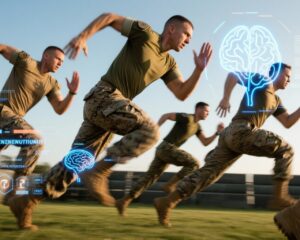Highlight
- Low-dose caffeine (200 mg) reduces cortical drowsiness reflected by decreased delta wave power shortly after ingestion in fatigued Taekwondo athletes.
- Caffeine enhances cognitive processing as demonstrated by increased P300 amplitude in auditory event-related potentials post fatigue induction.
- No significant caffeine-induced improvements were observed in sport-specific physical performance or physiological fatigue markers after combined mental and physical fatigue.
- Findings suggest caffeine’s primary beneficial effect post-fatigue lies in cognitive enhancement rather than physical performance amplification in combat sports.
Study Background and Disease Burden
Caffeine is widely recognized as an ergogenic aid used to combat fatigue and improve both cognitive and physical performance across diverse athletic disciplines. In combat sports such as Taekwondo, where rapid decision-making and physical agility under fatigue are crucial, caffeine’s dual impact on brain function and physical output remains inadequately characterized. Fatigue, both mental and physical, can impair reaction times, cognitive alertness, and motor performance, directly affecting competitive outcomes and athlete safety. Understanding caffeine’s neurophysiological and performance effects following combined fatigue is essential for optimizing supplementation strategies in competitive combat sports, which currently lack tailored recommendations that factor in sport-specific demands and fatigue contexts.
Study Design
This investigation was a randomized, double-blinded, placebo-controlled crossover trial involving thirteen male Taekwondo athletes. Participants underwent two experimental conditions: ingestion of 200 mg caffeine (CAF) or placebo (PLA), with a washout period between sessions. Assessments were conducted at three time points: baseline (pre-supplementation), 30 minutes post-supplementation (post-Sup), and immediately after combined physical and mental fatigue induction (post-I). Measured variables included physiological parameters (heart rate, blood glucose, blood lactate, and ratings of perceived exertion), electroencephalographic (EEG) brainwaves recorded during resting eyes-open states, auditory P300 event-related potentials (ERPs) indicative of cognitive processing, and Taekwondo-specific agility tests (TSAT) to appraise physical performance.
Key Findings
The administration of 200 mg caffeine elicited several neurophysiological changes without corresponding improvements in physical performance or physiological fatigue markers. Notably, caffeine significantly suppressed delta wave power at frontal and parieto-occipital electrodes at 30 minutes post-ingestion (post-Sup) compared to placebo (p < 0.05). Delta waves are commonly associated with cortical drowsiness; their reduction suggests a caffeine-induced transient alleviation of central fatigue.
Subsequently, caffeine increased P300 ERP amplitudes at central and parietal sites from post-Sup to post-I (p 0.05). Importantly, auditory oddball task performance metrics—including reaction time, accuracy, and error rates—were not significantly different across caffeine and placebo conditions (p > 0.05).
Contrary to hypothesized ergogenic effects, caffeine did not significantly alter Taekwondo-specific agility test scores or physiological parameters such as heart rate, blood glucose, blood lactate, or subjective exertion ratings (p > 0.05). These results suggest that while caffeine favorably modulates brain activity associated with cognitive fatigue, it does not translate into measurable improvements in physical performance or metabolic fatigue indices in this population and protocol.
Expert Commentary
This study robustly characterizes the selective cognitive benefits of low-dose caffeine in fatigued combat sport athletes. The neurophysiological evidence aligns with prior research demonstrating caffeine’s adenosine receptor antagonism leads to heightened cortical arousal and attentional resource allocation post-fatigue. The increase in P300 amplitude without latency shift may indicate enhanced attentional engagement or resource allocation rather than accelerated processing per se.
However, the absence of physical performance gains raises questions about dose adequacy, timing, and interindividual variability in caffeine metabolism. Combat sports performance integrates not only agility but also strength, power, and complex motor coordination, factors which might require different caffeine dosing strategies.
Limitations include the modest sample size and restriction to male athletes, potentially limiting generalizability. Furthermore, physical fatigue induction methods and timing relative to caffeine pharmacokinetics might influence efficacy. Future explorations should delineate dose-response relationships, genotype influences on caffeine metabolism, and combine multi-dimensional performance assessments to optimize caffeine use in competitive settings.
Conclusion
This randomized crossover trial demonstrates that a single moderate dose of caffeine (200 mg) selectively enhances cognitive function by reducing central fatigue markers and augmenting cognitive processing, as indexed by EEG delta wave suppression and increased auditory P300 amplitude in fatigued Taekwondo athletes. However, these neurophysiological improvements do not extend to physical performance enhancements or changes in physiological fatigue parameters. These findings emphasize caffeine’s role as a cognitive ergogenic aid rather than a physical performance enhancer in fatigued combat athletes under the tested conditions. Tailored caffeine dosing protocols considering individual metabolic profiles and sport-specific fatigue demands are warranted to fully leverage caffeine’s ergogenic potential in combat sports.



